#decolonizing the classroom
Explore tagged Tumblr posts
Text
I've been reading the updates on Gaza, and what I've read has made me extremely worried about Mohammed (@ahmed0khalil) and his family who are in Deir el-Balah right now.
There have been continuous relentless attacks on Deir el-Balah. Israel has been targeting tents in Deir el-Balah. Just a few hours ago, Israeli fighters have just bombed a home in that area, killing at least 5 people, including 2 children.
Mohammed and his family are sheltering in a UN classroom right now. Israel is known to target schools sheltering displaced people. Just yesterday another school where displaced families are sheltering has been attacked. This is the fourth school Israel has bombed in less than a week! But they don't have nearly enough funds to evacuate!
Mohammed is only 19 years old and he has 5 siblings. Things have been difficult for them his brother Fathi who is blind, his other brother Abdullah who is autistic and does not understand what is happening, and little 6-year-old Ahmed. They are all suffering from malnutrition because they don't have enough money to buy food, and that is on top of the frequent attacks they have to face every day!
Mohammed's campaign has been shared by 90-ghost as well as vetted by @/gazavetters and is #77 on their vetted list. I've also been communicating regularly with him. Please help! Your donation can mean life or death for them!
Low Funds! Only €3,418 raised of €50,000 goal!
Tagging for reach, please dm me if you want off the mailing list! We thank you in advance.
@dlxxv-vetted-donations @ahaura@ana-bananya@northgazaupdates@c-u-c-koo-4-40k@riding-with-the-wild-hunt @roadimusprime@aces-and-angels@just-browsing1222@neptunerings@mushroomjar@northgazaupdates2@kyra45-helping-others@decolonize-solidarity @heritageposts@timetravellingkitty @briarhips @akajustmerry @wellwaterhysteria @rhubarbspring@nevert-the-guy@ethanscrocs @gumy-shark @khizuo @brutaliakhoa @decolonize-the-everything @postanagramgenerator
@eternal-fractal @pathogenic @nonbinary-support @mar64ds @bixels @aria-ashryver
@schoolhater @pcktknife @transmutationisms @sawasawako @feluka
@fiqrr @irhabiya @sharingresourcesforpalestine @batmanego
@lonniemachin @aristotels @watermotif @stuckinapril @chanafehs@malcriada @appsa @serialunaliver @buttercuparry
@psychotic-gerard @mavigator @communistkenobi @socalgal @chilewithcarnage
@ghelgheli @determinate-negation @papasmoke @deepspaceboytoy @omegaversereloaded@paper-mario-wiki @mangocheesecakes@sayruq
@xinakwans @givemearmstopraywith @loombreaking @killy @deathlonging
@palms-upturned @blackpearlblast @littlegermanboy @loveaankilaq @sar-soor
@fridgebride @27-moons @tamarrud @familyabolisher @fleshdyk3
@palipunk @gothhabiba @punkitt-is-here
1K notes
·
View notes
Text
Statement from Professor Eve Tuck
"Let me be completely clear about my personal and individual point of view: "I condemn Hamas' terrorist attack on Israel, and the taking of hostages, whose safe and swift return I fervently wish for. I reject antisemitism; it is repugnant and indefensible. "I have taught at universities for over a decade and a half. I welcome students bringing a range of views into the classroom; it's vital to the teaching and learning process. I have always believed my role in the classroom to be one of helping students develop their thinking skills, not telling them what to think."
"decolonization is not a metaphor" has always been a nonsense paper in the literal sense: it imparts no sense, makes no arguments, has no meaning. it alludes to ethnic cleansing but shies away from it; likewise eve tuck can't make a single coherent statement
70 notes
·
View notes
Text
First draft of first chapter of Working Title “Dreaming of New York”
It’s a story about west Germany and two boys and music and this chapter is missing like a whole chunk out of it because I’m not Catholic 💀
Happy pride month y’all
Please feel free to leave your thoughts and/or tell me what I could improve
Berlin was a city kissed by war. Kissed was an understatement. Perhaps fucked, brutally, just the way the Berliners liked it. The war had been 15 years ago; ended just after Feli was born. New war had taken its place before he had even gained sentience. Constant turmoil followed. There was no point checking the news as every headline was always the same. The Soviet Union threatens America with nuclear bombs, America threatens the Soviet Union with nuclear bombs, we’re all going to die!
And yet the world kept spinning. The days kept going by. School was never cancelled over empty threats, nor was work. The war impacted borders but seemingly not the amount of moving Feli’s uncle had to do for his company. And Berlin, this city ravaged by war, was the next stop. “The last”, his uncle had promised. He didn’t believe that for a second. The only thing that could make this the last stop in this endless journey of adolescence would be mutually assured destruction.
The Berliners were strange. They were unlike the Italians, or the Swiss, or even the Bavarians. They were more American, though perhaps less well fed. Despite the war, Europe had maintained a degree of conservatism. A “they will not replace us” mentality, no longer targeted at the Jews, but rather at the Americans. As Feli’s uncle had explained to him, after the war the Americans did more than just take over Germany. With the formation of the United Nations calls had been made for countries such as England and France to decolonize. Gandhi had gained India its independence, Indochina was now Vietnam, and of course, Ethiopia was no longer an Italian possession. Feli was no longer an Italian possession either. He was in Berlin. West Berlin. The American puppet city. Very obviously so.
He and his uncle had just moved into their apartment the previous afternoon. All their luggage was still yet to come up from Munich. He had been pretty active in the church at Munich. Were there catholic churches in Berlin? There had to be. One of the few possessions he had brought up was a latin bible he personally had annotated. Latin had been easier to learn than German. That was why he learned it… though he could speak German, of course. Perhaps that would be what he would do today, go shopping for schoolbooks and look for a Catholic church. School started tomorrow after all.
---
Feli said a prayer before entering the school house. It was a co-ed institution, publicly funded, “Realschule” as the Germans called it. The way Feli understood it, there was school for dumb folks, school for smart folks, and Realschule, though he had only lived in Germany a year before this. Either way, he was anxious to enter. He had been scandalized the previous day by seeing a woman carelessly wearing a skirt that she had outgrown. It didn’t reach under her knees! He was terrified of what fashion choices hormone riddled teenagers may make in the heat of the Berlin summer (which, in his opinion, was not very hot, but he understood could be different for everyone). The classroom was organized in alphabetical order. “Achille, Felix”, was the seat closest to the door. Feli glanced around anxiously before taking his seat. Everyone around him seemed to be dressed well enough, the worst he saw was a plain white T-Shirt.
And then he came in. A boy who looked painfully American. A perfect disruption in the flow of a world that seemed to be conformist while trying desperately not to be. He still had his sunglasses on, inside. He was wearing a leather jacket in the middle of summer, and his T-shirt had the words “Elvis Presley” written on it, over a crude portrait of the man drawn in the same black marker. He took the seat behind Feli. Attendance would reveal his name: Ludwig Bohrer, about as German as you could get.
The teacher made no comment on Ludwig’s ridiculous get up, and class started as normal. Rules were laid out, introductions were made, and as they made a start to begin work, Feli felt a tap on his shoulder. He turned to look back at Ludwig, who he now noticed had his teeth tightly bound by metal brackets, which shone in a matter that was almost startling. “Are you new?” the boy asked, tilting his head like some confused dog.
“Yes,” he replied quietly. He wasn’t sure if they were allowed to talk, nobody else was.
“Italian? Achille, right? That’s an Italian name.”
“Kind of. I was born in Rome.” If they were in the back of class he may have engaged him in conversation further, but they were right within the teacher’s earshot, and Feli would rather be disliked by his peers than his teachers.
Ludwig seemed to lack that motivation. “Well, benvenuto! Welcome to Berlin! You lived in Switzerland for a bit?”
“Yes.” How did he know that?
“Yeah, your accent is a bit hard to understand, I figured it was just because you were Italian but that makes sense. I go to Switzerland all the time on holiday.”
Feli made a noise of acknowledgment. Could this boy take a hint for the life of him?
“Yeah I really like hiking in the alps, probably the only proof I’m a German other than my name and mother tongue.” Feli was just trying to do his assignment while this boy was talking at him… trying was perhaps not the right term. It was a short math review of concepts that students should know, Feli was kind of guessing. He knew his geometry but he’d never been the best at algebra.
“How about you focus on your assignment so I can focus on mine,” he finally replied.
“Ah! Yeah! Sorry about that!” Feli turned to look back at Ludwig who stared blankly at his paper for a moment, but as soon as his pen touched the paper he was scrawling away. Feli figured that would be the end of that.
It was not.
At lunch time, Feli once again ran into the boy, who ran over to him, his messy blond hair falling in curls over his face. He seemed to have switched his sunglasses for normal glasses with the same American, aviator frames. Wire thin, too small to support the heavy glass he had been prescribed. “I was hoping I’d have you in some other classes but alas…” Feli had not made an impression worthy of all that.
“Why?” Feli could feel his head tilt as he said that, social mirroring was real and a plague.
“Well you are new, and an immigrant, and I know everything.” Ludwig smiled. Feli’s eyest were still drawn to his metallic teeth.
“Really?” Feli laughed, “everything?”
“Yes sir! Lived in Berlin my entire life.” The boy straightened himself, he wasn’t very tall, perhaps around 160 centimeters tall. Not that Feli was any taller than that. Germans were just… typically larger.
“You seem a bit lacking in knowledge of social convention.”
“Oh I know plenty. But why be conformist? We aren’t Nazis anymore. Individuality is our greatest defense against fascism.” So he was one of those types. “I took etiquette lessons as a boy, if there’s really something you feel you need to know on that front I can direct you.”
When I was a boy, said perhaps the most boyish kid in the school. “Perhaps…”
Ludwig scrunched his nose a bit at that, Feli wasn’t exaclty sure what kind of emotion he was trying to convey. “D’you smoke?” Historically, no. Feli’s uncle had cigars but they were his cigars, not to be touched by nephews desperate to fall into a bad habits. However, Ludwig had asked in a tone that implied he’d be willing to give Feli a cigarette or two.
“Yeah.”
“I’ve got a good smoking spot if you want to come with. I’ll spot you a cigarette.” Ludwig started walking away before Feli could even reply. He wasn’t quite sure why he followed. Surely the allure of free cigarettes could not have been that tempting for a non-smoker. It could have been a vairety of factors, the allure of doing something he wasn’t supposed to, the fact it had been becoming increasingly clear as they stood in the cafeteria unbothered by other students that Ludwig did not have friends, or perhaps a curiosity that could not quite be defined.
The two of them walked out to a spot behind the school, it was not particularly well hidden, but it was outside. Feli could hardly call Berlin air fresh, it already almost always smelled of cigarettes on the street, but it was better than the stuffy classroom. This part was on grass rather than paved, the sun shone above, and Ludwig sneezed a couple times as they stepped into it.
“Sorry, that always happens when I don’t have sunglasses on. Allergic to the sun or something,” Ludwig said after a ‘gesundheit’ from Feli.
“You’re pale enough to be a vampire.” Feli smiled. It was true, Germans were fair, especially Prussians, but he was almost abnormally so, not a single freckle or sunspot on his skin, only acne.
“Hey!” Ludwig’s eyes were fixed on his lighter rather than Feli. He lit two cigarettes, handing the first one to Feli. “So which are you liking better?”
“Hm?”
“Berlin or Munich?” Ludwig took a draw from his cigarette, Feli mirrored the behavior. He didn’t cough, he’d gotten cigarettes off of friends before. Was Feli allowed to say Munich? It was certainly less stressful. A lot prettier. Still destroyed by the war but the Bavarians had a thing for architecture. What was his name… that mad King? Oh Feli forgot, but he had basically built everything impressive down there.
“Munich, if I’m going to be entirely honest.”
“Yeah… most people do, especially these days. It’s safer down there I’d think.”
“Really?”
“Well naturally, I mean, our neighbors on all sides want us dead. Walled in city.” Ludwig gestured away from himself, to imply the wall surrounding them. “They say it’s so East Germans don’t come over. Commies wish only to flee communism. We can’t let ‘em in because of their government… I think people also don’t really like the East Germans these days.”
“You think?” Feli crossed his arms. Much of what he had heard out of East Germany down in Munich was about how they wanted to destroy the West. How they were the latest proxy in the USSR’s plan of world domination. How the stasi were everywhere. East Germans were morons falling for the same lies Hitler had sold just fifteen years ago. The Bavarians thought all Prussians were bloodthirsty morons, but especially those in the East.
“I like to think much of us pity them. Those are our family after all. Most of them don’t want to be over there. They want to be free… They’re more free in the walled in city than they are on their side of the iron curtain. Is that not insane? Did the Italians and the free Italians think of one another as enemies during the war?”
“I’m not sure, I hadn’t been born yet.” They must’ve, it was a war. Feli’s unclecertainly thought that way, according to his recount
“It’s funny to think I was born into what we considered a free Europe considering everything.” Ludwig had finished his cigarette and stomped it out on the ground. “Sorry, a bit heavy, eh? I’m not great with first impressions.”
“Couldn’t tell,” Feli joked, putting out his cigarette as well.
“Ugh, I don’t want to go to class, have you ever played hooky?”
“Played what?”
“English term for skipping. Apologies. My parents would be mad, but I don’t think it’s often they aren’t mad at me recently.”
“My uncle doesn’t care so long as I graduate.” Skipping the first day of school seemed like setting a bad precedent, but if Feli flunked out of high school he could just work in the church, honestly.
“Awesome. You live with your uncle?” Ludwig was walking away from the schoolhouse.
“Yeah.”
“Parents dead?” Ludwig failed to make eye contact when asking such a significant question.
“What kind of question is that?” a tone of offense worked its way into Feli’s voice. He wasn’t offended. But seriously, who would just ask that?
“Ah, sorry, was that inconsiderate? Tell me whatever you’re comfortable with.” Ludwig finally turned back to look at him, his face had reddened a bit.
“My parents aren’t dead. Or they might be, not sure. They weren’t the last time I saw them.”
“Noted.” Ludwig walked with a certain skip in his step, Feli noticed. His right hand seemed to be keeping count, like how one would bounce their foot to keep track of rhythm in music. “Ever been to a music store?”
“Can’t say I have,” Feli replied. He’d been to concert halls, he knew how to play some things on a violin his Aunt had gotten him at some point, and he listened to the radio sometimes when he was bored, but he had never been to a movie store.
“There’s one close by. American owned. Import all kinds of records from the United States.”
“I’m pretty sure most music stores sell American records, what else really is there?”
“English, French, classical. I bet they have Russian records on the other side of the wall. Yugoslav maybe,” amusement entered Ludwig’s voice as he mentioned Yugoslavia, “but American is the best, that’s why Hitler banned all of it. Jazz, blues, country, all that fun stuff. Hitler hated that people were better at art than him. If Rock had existed at that point he would’ve banned that too.”
Feli’s eyes drifted to Ludwig’s Elvis shirt. “Are you looking for something Elvis?”
“Nah, Chuck Berry.” His pronunciation of the name was startlingly American, “I want to see if we’ve imported any of his stuff, heard it when I was over there a while ago. I might argue he’s better than Elvis. Honestly though, I just like browsing their records. We don’t make music in this country anymore. You like music?”
“Yeah, I can play the violin. Can you play anything?”
“Oh naturally, it would be ridiculous if I couldn’t. Piano and guitar. Classically trained in piano, picked up guitar on my own. Would invite you to my place to hear but… no actually that might be a great idea.”
“Hm?”
“Well, my mama’s always on my case about how I don’t have friends and still skip school. Might be a step up if I’m skipping school with a friend, yeah?”
A smile found its way onto Feli’s face. Sooner or later, he’d figure out why Ludwig Bohrer had no friends, he was sure. It was never a good sign. He had heard that north Germans especially were very hard to make friends with. It was lucky to be able to find someone this early on, even if he was likely a freak.
A soft bell rang through the air as Ludwig shoved the door of the music shop open. He seemed to place his whole weight on it even though he, presumably, did not have to. The place was not in any typical European style. The floors were checkered red and white, walls displayed posters of a myriad of American artists: Elvis Presley, Connie Francis, Frank Sinatra, some fellow named Nat King Cole that Feli had never heard of before. They even had a shelf labeled “In Memoriam” under a poster of a fellow named Buddy Holly.
“Who’s that?” Feli pointed to the shelf.
“Buddy Holly, a good, young rock star from Texas. He died last year, fatal plane accident, way too young. Been a bit long to still keep the in memoriam though,” Ludwig switched to English and raised his voice, “Right, Tommy?”
The store clerk peeked his head out from behind a corner that presumably led to more music storage. “Ah! Ludwig! Skipping school your first day?”
“It’s not like anything important happens the first day of school!” Ludwig crossed his arms.
“It’s a slippery slope kid, skip enough school and you’ll end up like me.” The store clerk lit a cigarette, he had sat at the counter and was now making eye contact with Ludwig.
“You moved abroad and fund a music shop hardly anyone goes to off of your own personal fortune. That’s not a bad life.”
“Alright, kid, what are you here for?”
“Got any Chuck Berry?”
“Yessir.” The clerk pointed to a shelf near the back of the shop. Ludwig grabbed a couple records from it and walked back up to the front. Feli himself decided to browse the area nearer. A bit of Elvis never hurt anyone.
Ludwig was rung up, paid, and the two exited the shop. Feli noticed Ludwig seemingly had six more records than he initially bought. He hadn’t heard any conversation that would indicate him buying more, just “here’s your change”, “thank you for shopping here”, all that. The streets of a once glorious city winded their way to the train station. Ludwig bought two tickets, insisting to pay for Feli’s since he was the one who dragged him out of school in the first place. They took the U-Bahn to a wealthier part of the city.
“You know, there are two lines that run through the East,” Ludwig said quietly as the two stood waiting for their stop.
“Really?” Feli looked up at him.
“Yeah, we’re not going on one but… imagine how much of a nightmare that must’ve been to sort out.”
“Yeah…”
They continued the rest of their trip in silence, even though the car they were in was pretty much empty.
Ludwig’s home was large. Larger than any home Feli had ever lived in. Feli had mostly lived in apartment complexes built or rebuilt post war. Ludwig’s residence was, in comparison, an antiquated mansion. He wasn’t expecting that at all.
Dark wood floors greeted him along with the smell of ancient lacquer. Shoes came off as Ludwig led him up carpeted stairs with a grand banister and a large flight halfway up that Feli could imagine an actress standing on, waving goodbye to her lover in the climax of some romantic tragedy. The wood smelled less strongly of lacquer on the second floor, Ludwig’s room was behind the first door. It was completely different from the rest of the home. A large red shag carpet laid on the floor and a guitar and stereo sat in the corner. Posters lined his walls, some of American artists, but one particular one of American presidential candidate John F. Kennedy encouraging ballots to be cast for him. What use that would have in Germany, Feli was unsure of. Aside from that, everything in the room was music. Notes served as organizational labels. Multiple radios sat on the desk next to a set of tools. Binders of sheet music lined the shelves like books would. And records sat stacked near a record player. Even Ludwig’s bedding was covered in some ominous composition (Ludwig clarified Mozart upon noticing Feli staring). It seemed any odd desire could be fulfilled if you were rich.
Feli fiddled with the dial on one of the radios, expecting it to be broken, but the thing immediately turned on. Connie Francis’ Die Liebe ist ein seltsames Spiel came on and Ludwig immediately rushed over, practically tripping over his desk chair to turn it off.
“I hate that song so much.” His tone was almost frightening.
“How come?” Sure, it was overplayed, but it seemed right up Ludwig’s alley. American pop.
“Every time I turn on the radio it’s just,” Ludwig pitched his voice up in mockery and started singing the chorus badly, “Die Liebe ist ein seltsames Spiel, Sie kommt und geht von Einem zum Andern— you know? I’m sick of it. Wanna hear something good?”
“Sure,” Feli followed Ludwig to his records as he grabbed the top one off the stack. It was the same one he had bought from the record store.
It was the same one he bought from the record store.
The records from the record store sat on the other side of the room, by the door, he had set them down fairly hastily while surveying Feli as he looked through his things. Why would he need two of the same record? Did he forget? Feli walked over to the records he had purchased from the record store as Ludwig set up the record player. Of the six bought, five of them already sat in his collection.
“This is my favorite song right now,” Ludwig said, drawing Feli back into the moment. He was sat in his bed kicking his feet back and forth to the rhythm of the song, singing along in English. Feli wasn’t great at listening to English, the most he could make out was the name “Beethoven”. He read the album cover again just to make sure he wasn’t losing his mind. “Berry is On Top”. Same both places, same graphic of a very American ice cream sundae. This was probably the oddity of Ludwig Bohrer that drove people away, but he wasn’t even sure what exactly it was. Hoarding?
“Why do you have multiple of the same record?” Feli’s tone of voice was judgmental, he couldn’t help it.
“Oh! Do I?” There was some hint of anxiety in Ludwig’s voice. It cracked.
“Five doubles.”
“Ah well I got a good few of those for free so it doesn’t matter. I’m Tommy’s favorite customer so he gives me free things sometimes, it’s no matter, I’ll find something to do with them.”
“Can I have one?” Feli asked. He felt like he’d caught Ludwig in a lie but he couldn’t understand what he could possibly be lying about.
Ludwig stood up and inspected them. “I don’t—“
The door to Ludwig’s room swung open. A woman who could only be his mother stood in the door frame, arms crossed. “Ludwig Emmerich Maximilian Bohrer.”
Ludwig jumped, making eye contact with his mother. “Hi mama…” he squeaked.
#writing#writerblr#writers#creative writing#writerscommunity#writers on tumblr#historical fiction#Cold War fiction#lgbtq fiction#lgbt fiction
5 notes
·
View notes
Text
by Christopher Rufo
Portland, Oregon, has earned its reputation as America’s most radical city. Its public school system was an early proponent of left-wing racialism and has long pushed students toward political activism. As with the death of George Floyd four years ago, the irruption of Hamas terrorism in Israel has provided Portland’s public school revolutionaries with another cause du jour: now they’ve ditched the raised fist of Black Lives Matter and traded it in for the black-and-white keffiyeh of Palestinian militants.
I have obtained a collection of publicly accessible documents produced by the Portland Association of Teachers, an affiliate of the state teachers’ union that encourages its more than 4,500 members to “Teach Palestine!” (The union did not respond to a request for comment.)
The lesson plans are steeped in radicalism, and they begin teaching the principles of “decolonization” to students as young as four and five years old. For prekindergarten kids, the union promotes a workbook from the Palestinian Feminist Collective, which tells the story of a fictional Palestinian boy named Handala. “When I was only ten years old, I had to flee my home in Palestine,” the boy tells readers. “A group of bullies called Zionists wanted our land so they stole it by force and hurt many people.” Students are encouraged to come up with a slogan that they can chant at a protest and complete a maze so that Handala can “get back home to Palestine”—represented as a map of Israel.
Other pre-K resources include a video that repeats left-wing mantras, including “I feel safe when there are no police,” and a slideshow that glorifies the Palestinian intifada, or violent resistance against Israel. The recommended resource list also includes a “sensory guide for kids” on attending protests. It teaches children what they might see, hear, taste, touch, and smell at protests, and promotes photographs of slogans such as “Abolish Prisons” and “From the River to the Sea.”
In kindergarten through second grade, the ideologies intensify. The teachers’ union recommends a lesson, “Art and Action for Palestine,” that teaches students that Israel, like America, is an oppressor. The objective is to “connect histories of settler colonialism from Palestine to the United States” and to “celebrate Palestinian culture and resistance throughout history and in the present, with a focus on Palestinian children’s resistance.”
The lesson suggests that teachers should gather the kindergarteners into a circle and teach them a history of Palestine: “75 years ago, a lot of decision makers around the world decided to take away Palestinian land to make a country called Israel. Israel would be a country where rules were mostly fair for Jewish people with White skin,” the lesson reads. “There’s a BIG word for when Indigenous land gets taken away to make a country, that’s called settler colonialism.”
Before snack time, the teacher is encouraged to share “keffiyehs, flags, and protest signs” with the children, and have them create their own agitprop material, with slogans such as “FREE PALESTINE, LET GAZA LIVE, [and] PALESTINE WILL BE FREE.” The intention, according to the lesson, is to move students toward “taking collective action in support of Palestinian liberation.”
The recommended curriculum also includes a pamphlet titled “All Out for Palestine.” The pamphlet is explicitly political, with a sub-headline blaring in all capital letters: “STOP THE GENOCIDE! END U.S. AID TO IRSAEL! FREE PALESTINE!” The authors denounce “Zionism’s long genocidal war on Palestinian life” and encourage students to support “boycott, divestment, and sanctions” policies against Israel.
The pamphlet includes chants that teachers can adopt in the classroom. Some imply support for militancy and political violence: “Resistance is justified when people are occupied!”; “We salute all our martyrs! mothers, fathers, sons and daughters!”; “Justice is our demand! No peace on stolen land!”
It’s not immediately clear to what extent the “Teach Palestine!” lessons have been adopted in Portland public school classrooms. But the teachers’ union claims that the district has been “actively censoring teachers” for promoting pro-Palestine ideologies; in response, it has assembled a legal guide for how teachers can keep promoting the lessons under the guise of meeting state curriculum standards.
30 notes
·
View notes
Text
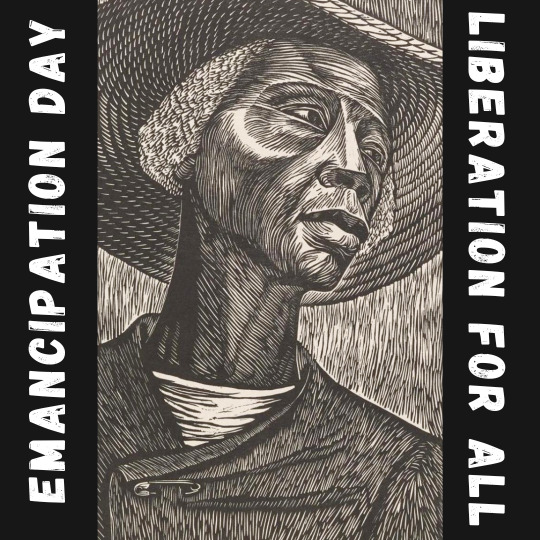

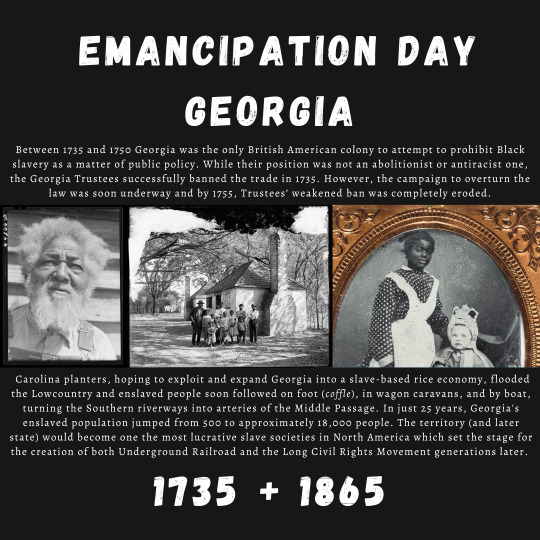
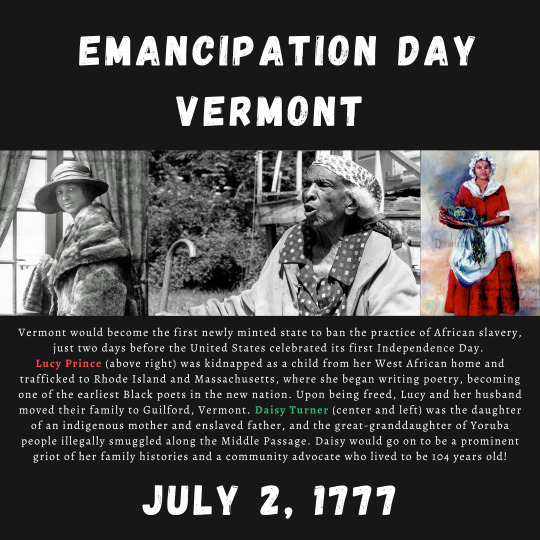
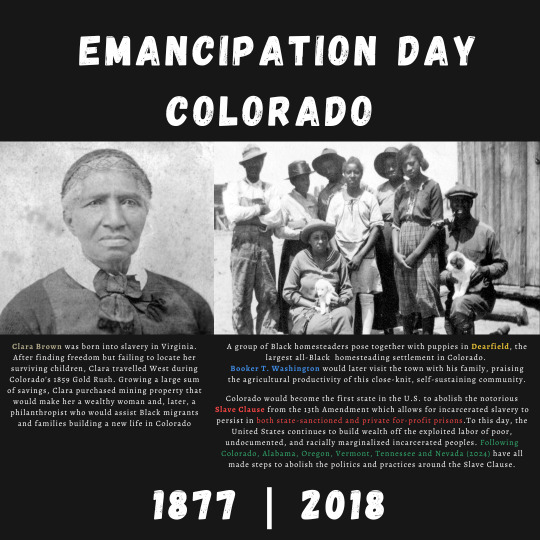
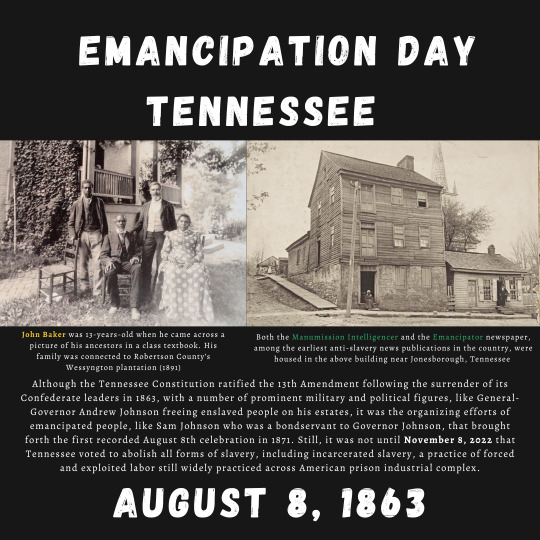
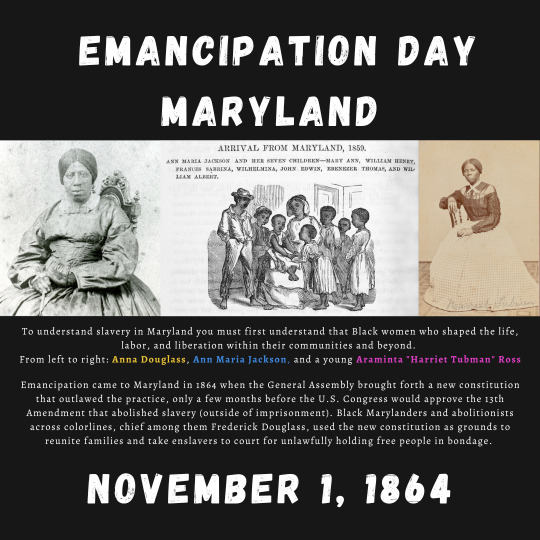
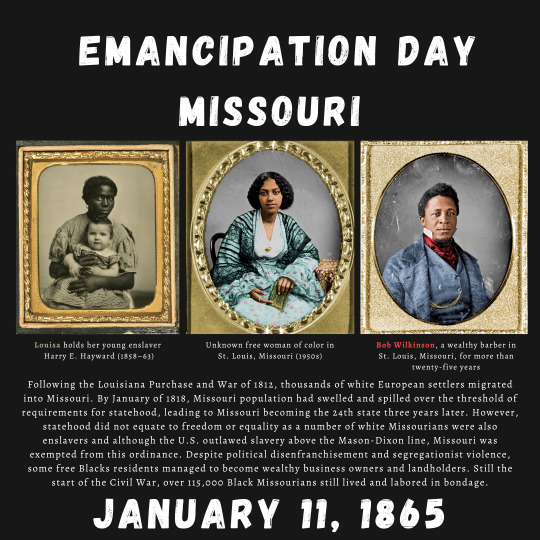
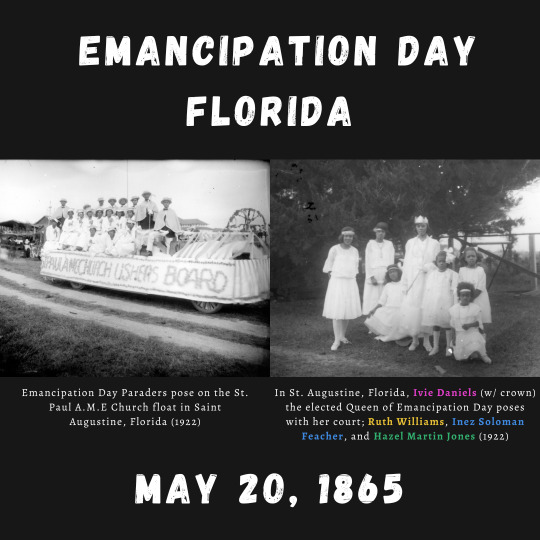
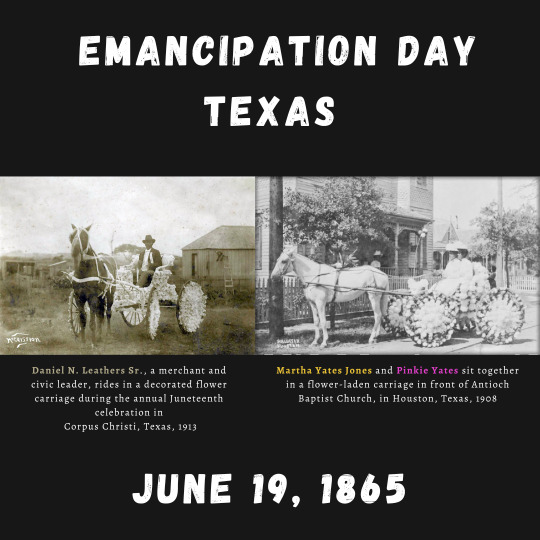
On August 8, 1863, Tennessee ratified the 13th Amendment, abolishing the domestic slave trade of Black + indigenous folks in the state. 159 years later in 2022, Tennessee folks voted to abolish all forms of slavery in the state, including the "Slavery Clause" that allows for incarcerated slavery to persist in both state-sanctioned + private for-profit prisons.To this day, the United States continues to build wealth off the exploited labor of impoverished, (dis)abled, undocumented + racially marginalized people who are incarcerated.
Each community and country that participated in the Transatlantic Slave Trade has its own emancipation day (or year).
And yet, as of 2023, Colorado, Alabama, Oregon, Vermont, Tennessee + Nevada (2024) are the only U.S. states who have made steps to abolish slavery in all its forms. That's not even touching how slavery, both state-sanctioned and illegal bondage, continues to bleed into our everyday places from child labor + forced s*x work to penal plantations and chocolate factories (looking at you at hershey chocolate)
In this second wave of Jim & Jane Crow flooding our world, we must arm ourselves with the tools to disrupt systems, distribute resources + deepen our collective action + good trouble ~
If you wanna explore the full Emancipation post + readings, come join us in the garden community over on Patreon where we upRoot our miseducation through history lessons, community conversations + book talks + decolonizing our everyday practic, our classrooms + our communities.
Reclaim your emancipation + immerse yourself in the ancestral, antiracist liberation! 🖤✊🏾✨️
#prison abolition#our world#black lives matter#ecosystem of white supremacy#our history is your history#politics#13th amendment#padawan historian#cite black women#reclaim the fourth#emancipation day
93 notes
·
View notes
Text
On the stump (h.s.)
Author's note: english is not my first language, so please excuse any mistakes. Also, this first part is shorter but the others will be longer. Hope you enjoy. xx
Part I
"Y/n, please see me in my office after class." Professor Morris gave her a small smile after his request. "Nothing to worry about. Just some opportunities I would like to present you."
Y/n sighed of relief as the auditorium started to fill with sleepy students. She tought Mr. Morris would lecture her about the small pile of multiple choice exams in his desk that weren't all graded yet. Being a TA was reveling to be more time consuming than expected. She would have to reorganize her agenda for the third time this week, which also meant that she would have to skip tonight's plans with her friends. There was no room for mistakes or delays, if Mr. Morris was still planning to write her that recommendation letter.
"Alright, today we're going to talk about the decolonization of India. Don't forget the mandatory readings for this part of the course. I will not be speaking in detail about the process of independence of each asian countrie. If you have any questions, y/n can help you during office hours."
How wonderful, y/n thought, more workload. Must be punishment for all those exams.
...
"Take a seat". She pushed the dark oak chair back and smoothed her navy skirt before sitting down.
"This won't take long." He oppened a drawer on his desk, took some papers out of it and started to go through them.
"I have some connections in Vienna." He stopped and looked at her suggestively, adjusting his glasses. Y/n's palms started to sweat.
"I know New York would be more preferable, but Vienna is the only place now with open seats." Oh God. There was a faint quick thump sound in Mr Morris's office. It was y/n's nervous foot tapping in anticipation. He continued to flick through the pieces of paper until he found the one he wanted. Professor Morris pushed the single page in y/n's direction. Her hopeful eyes made him chuckle.
"That is a list of people responsible for selecting the interns at the UN offices in Vienna. Search their names and study them. I have also scribbled some tips for your upcoming interview." Y/n deviated her gaze from the paper to her professor in confusion.
"My interview?" Mr Morris smiled.
"Yes, your interview. Your application was accepted. You should receive an email soon explaining that you will move on to the next phase." She picked up the paper and pressed it tightly to her chest.
"Thank you, so much." He got up from his chair and buttoned his blazer.
"Now, if you fufill your position successfully as a TA by the end of the semester, I will make sure a recommendation letter gets to those offices." Y/n got up so excited her chair squeaked loudly and almost made her cringe. She was to happy to feel embarassed.
"I will not disappoint you, Professor Morris." She promised.
"I'm sure you won't." He then checked his wristwatch and complained about a meeting he was having with the faculty. Y/n took it as a cue to leave, but not without thanking him one more time.
...
The few students passing by looked strangely at the girl with the wide smile and a spring in her step. Who looks that enthusiastic on a Thursday morning? Y/n did. And she had good reasons to. All her work seemed to finally bear fruit. Being an UN intern was going to propel her career in politics. She would actually learn how things work in the real world, outside classrooms and without textbooks. She would have the opportunity to travel and meet new experienced people. And right now she also had the perfect excuse to ditch her social plans, having to make sure all her extracurricular workload was sorted out. Being an incompetent TA was not an option, and not getting that internship was a scenario that y/n refused to conceive as a possibility.
As soon as she got to her dorm, y/n started to search the people on that piece of paper. Her gold tickect to the chocolate factory. She memorized their full names, academic backrounds, previous jobs, and their personal interests. She made some social media searches for that. Then, a draft for her interview was outlined based off of Mr Morris's tips. Serious but not boring, interesting but not fake, professional but still warm. An email notification made her stop typping. She clicked on the unread message and admired the positive response. Her eyes travelled through her desk. It was a mess. She was surrounded by heavy authors and heavier subjects. A pile of crinkled photocopies of ICJ cases, an open Krugman book with dozens of fluorescent post-its, a few flashcards with EU's legislative process. If her desk was a mess, it meant she was busy and working. That mess made her happy. Y/n looked back at the email and she thought to herself, I'm almost there, I'm going to change the world.
...
"Shit." The hot brown liquid spreaded through y/n's white oversized shirt. She tossed the paper cup in the bin and tried to keep the fabric from sticking to her skin. Her brallette was now visible through the wet shirt. As she walked to the small bathroom atached to the office, she mentally patted herself on the back for keeping an extra t-shirt in her bag.
The door to the office was closed and no one usually came at this time of day. She was safe to change. Y/n tried to remove the stain in the sink as much as she could. She then placed it on the back of the chair to dry. A thin light brown outline was still visible. She sighed in annoyance. That was her favourite shirt.
As she reached to her bag to grab the shirt, the sound of the door knob brought horror to her features. She quickly grabbed the piece of clothing and tried to hide her nude state behind the fabric. As the door opened, y/n could already imagine the chocked look on Mr Morris' face at her lack of clothing. She had a plausible excuse, of course, but it was still a very strange situation. She should have locked the door. Well, too late.
Her look of fear turned to a confused one as she stared at the man that entered the room. He paused, hand still grabbing the door knob, and stared back, as confused as her. They stayed like that for a couple minutes trying to make sense of the situation. Y/n grew annoyed at his lack of action. The door was still open for everyone to see her precarious state.
"Close the door!" He awakened from his trance and quickly shut the door, turnig his back to her. She took the opportunity to dress the clean t-shirt. As she pulled the fabric down her torso, she noticed him staring at her again. Y/n was becoming more and more irritated. She had been gradding tests for the past three hours, hadn't gotten any breaks, decided to get a coffe from the machine down the hall, spilled the drink on her favourite shirt and was now being checked out by some random man that would not say anything, not even an apology. He was about to confront a very grumpy side of y/n.
"Are you a student of professor Morris? Office hours are only on Mondays and Wednesdays. I do not have time to answer any questions today." She went to sit on the desk and continue her work, not bothering to look at him as she speaked.
"I was a student of his." The man approched the desk. "I came to visit him." Y/n continued to write notes with her red pen, avoiding eye contact. Her frustration still mixed with the embarassement from moments ago.
"Well, as you can see Mr Morris isn't here, and he won't be coming in today. You can schedule your visit using the contacts printed by door. I also recommend you to knock before meeting with the professor." Y/n added the last part, staring back at him. He stood tall with crossed arms and a hard gaze. She could see that he did not like the way he was being treated. Y/n wondered who this man really was. What if he was someone important? Someone close to Mr Morris? She realised maybe she should have approched him more carefully.
"I was not aware that TAs now felt so free to seduce their superiors. I'll make sure I knock next time, promise." Her annoyance became painfully obvious and the room grew even more tense. She got up from her chair and faced him fully. They were closer now. He hovered over her, angry gazes competing. Y/n noticed his deep green eyes and a single chocolate lock fell between them. That was annoying.
"I spilled coffee on my shirt, not that I owe you any explanations." She backed away slightly and straightened her posture. "I will not admit any insulting accusations about how I work. You don't know me." Y/n tried to calm herself down. She was grumpy and he was just provoking her. It was not worth her time, so she distanced herself from him. He did not say anything else. He only observed her as she checked the time on her phone. Its late, she thought, I'll finish this tomorrow.
"What? Time to get undressed in another professor's office?" Y/n shot him a death glare.
"You're an assh-" she was interrupted by the sound of the door knob. She immediately stoped talking as Mr Morris entered the room. The other man smirked at her, enjoying her big scared eyes.
"Y/n? What are you still doing here?" He noticed the piles of exams with red anotations here and there. "It's late. Please go home and rest. You can finish another time." Mr Morris gave her a reassuring smile. Y/n started to pack her things, happy that he hadn't heard her before. Bad language was a no go with the faculty, especially insults. It could damage her image as a TA.
"And I've seen you have already met Harry." They both exchanged awkward smiles. "Weren't supposed to..." Y/n gave a questioning look at the two men. Harry was now avoyding her eyes. She tried to ignore the whole situation and placed her bag in her shoulder, ready to leave.
"I'll see you next week. Get some sleep, y/n." Professor Morris waved her goodbye. Harry simply stood next to him, hands in his pockets, as he observed her closing the door.
...
Y/n sighed in relief as she closed her laptop. She had asked professor Morris if she could take the online interview in his office. Her small dorm didn't look very professional as a background. He allowed it, telling her to not worry to much. At this point, y/n felt like she could ask him to be her garantor and he would say yes. He was like the godfather she never had.
Y/n had a good feeling about the call. She got the interviewer she most wanted and she felt like they truly connected through their mutual interests. Plus, the tips on that golden piece of paper really came in handy. She would have to thank her professor for the millionth time. Now, all she had left to do was being a good TA, keep her grades high and trust that her capabilites would be good enough to grant her the spot she thought she was worthy of. Y/n thought some relax time was needed and well deserved. She pushed all her work aside, and texted her friends. That night she would be joining them.
14 notes
·
View notes
Text
Columbia’s Art History Legacy: How NYC Shapes Curation and Museum Studies
When we talk about art history in the United States, one name consistently emerges as a cornerstone of academic excellence and cultural impact: Columbia University. With its long-standing tradition of producing thought leaders in the fields of art history, museum studies, and curatorial practice, Columbia has played a major role in shaping how we engage with visual culture. But Columbia’s strength doesn’t exist in a vacuum. Its power lies in its location—New York City—a living, breathing museum that transforms theory into experience and classrooms into gateways to the world’s greatest collections.
This unique synergy between institution and city has helped make Columbia not just a university, but a launching pad for curators, historians, and cultural critics who influence how we view, preserve, and contextualize art.
The Legacy of Columbia's Department of Art History and Archaeology
Founded in 1875, Columbia’s Department of Art History and Archaeology is one of the oldest in the country. From its earliest years, it has been deeply intertwined with both European traditions and American innovation. Some of the most influential art historians, including Meyer Schapiro and Rosalind Krauss, have taught or studied within its halls.
Schapiro, in particular, helped establish Columbia’s reputation for rigor and originality. His interdisciplinary approach—connecting art with politics, literature, and philosophy—continues to influence generations of scholars. Columbia’s faculty members don’t just teach art history; they expand the discipline, redefine it, and ask new questions. Whether focusing on Medieval manuscripts or contemporary digital art, Columbia encourages students to study art as a social force—not just as aesthetic objects.
Location as Laboratory: New York City as the Classroom
One of the most transformative aspects of studying art history at Columbia is, quite simply, the ability to walk out of class and step into a museum. The university’s location in Morningside Heights places it within immediate proximity to some of the most important cultural institutions in the world:
The Metropolitan Museum of Art
The Museum of Modern Art (MoMA)
The Frick Collection
The Guggenheim Museum
The Whitney Museum of American Art
El Museo del Barrio
The Studio Museum in Harlem
This isn’t just convenient—it’s foundational. Students and scholars regularly conduct research using original artworks and archives, attend special exhibitions, and even partner with museums on academic projects. Museum internships and assistantships are integrated into the curriculum, making hands-on experience part of the learning process rather than an optional extra.
Moreover, Columbia’s own campus houses the Wallach Art Gallery, which serves as a testing ground for student curators and an exhibition space for important contemporary and historical work. Recent exhibitions at the Wallach have centered on underrepresented artists, community narratives, and transnational dialogues—mirroring the direction that contemporary curation is taking globally.
The Rise of Curatorial Studies
In response to the evolving role of museums and cultural institutions, Columbia expanded its offerings with the MA in Modern Art: Critical and Curatorial Studies (MODA) program. Launched in 1997, MODA is a bridge between academic study and curatorial practice. It prepares students not just to understand art intellectually, but to organize exhibitions, develop institutional programming, and question how museums shape public understanding of culture.
MODA students benefit from seminars led by curators, critics, and practicing artists, in addition to scholars. They gain insider access to institutions and work on exhibitions from conception to installation. They also investigate pressing issues in the field: decolonizing museums, repatriation of cultural heritage, digital curation, and representation.
What makes MODA especially powerful is that it doesn’t exist in isolation. It’s part of Columbia’s broader ecosystem—linked with the university's art history faculty, the Avery Architectural and Fine Arts Library, and its relationships with museums across the city.
Crossroads of Culture: Diversity in NYC and the Push for Equity
New York City is arguably the most diverse cultural capital in the world. This has had a profound impact on Columbia’s approach to art history and museum studies. Being in NYC forces students to confront the limitations of a Western-centric canon and instead explore a truly global perspective.
Columbia courses engage deeply with African, Asian, Latin American, and Indigenous art. And New York's own institutions reflect this expanding narrative. The Brooklyn Museum, for example, features collections that challenge colonial assumptions, while smaller spaces like the Asia Society Museum or The Africa Center offer in-depth perspectives on global contemporary art.
For Columbia students, this means exposure not only to the masterpieces of Western art but to emerging and underrepresented voices—voices they will one day help amplify through curatorial work. The art history curriculum increasingly reflects these values, training students to question institutional power structures and advocate for inclusive practices.
The Network Effect: Alumni and Influence
Columbia alumni are everywhere in the art world—serving as directors, curators, researchers, and policy leaders in major museums and cultural institutions. From The Met to international biennials, Columbia graduates bring with them a sense of intellectual depth, critical inquiry, and civic responsibility.
Examples include:
Thelma Golden, director and chief curator of The Studio Museum in Harlem, who studied art history and African American studies at Smith College but later taught and collaborated with scholars at Columbia.
Ann Temkin, Chief Curator of Painting and Sculpture at MoMA, who earned her PhD at Columbia and now shapes one of the most influential collections of modern art in the world.
Countless others who have contributed to museum publications, education programs, and groundbreaking exhibitions that rethink how art interacts with public life.
The Columbia network is more than professional—it’s philosophical. There is a shared sense of responsibility toward both academic rigor and public accessibility.
Shaping the Future
As museums and cultural institutions face new challenges—economic, political, and ethical—Columbia remains at the forefront of training the next generation of curators and scholars. Questions about restitution, climate change, artificial intelligence, and social justice are no longer peripheral to art history—they are central. And Columbia equips its students to lead these conversations.
It does so not by separating academia from the real world but by embedding study within one of the most vibrant and dynamic cities on Earth. Columbia and New York City don’t just teach art history—they make it, question it, and transform it.

#columbia university#college#university#historical film#history#art history#student life#college life#student#college student#studying#poetry#MuseumStudies#art education#TheMet#MoMA#TheFrickCollection#WhitneyMuseum#StudioMuseumHarlem#WallachArtGallery#Curation#ArtAndCulture#VisualCulture#CulturalHeritage#ArtCriticism#InclusiveCuration#DecolonizingMuseums#ArtInNewYork#ArtInstitutions#MuseumCulture
2 notes
·
View notes
Text
trying to read/familiarize myself with the kind of ideas and language i'll be using come the beginning of my diploma next year. this is book 1 of 16 ive managed to find on critical pedagogy, teaching in an era of neoloberalism, multiculturalism and decolonization in the classroom and early childhood education in Aotearoa new zealand. wish me luck
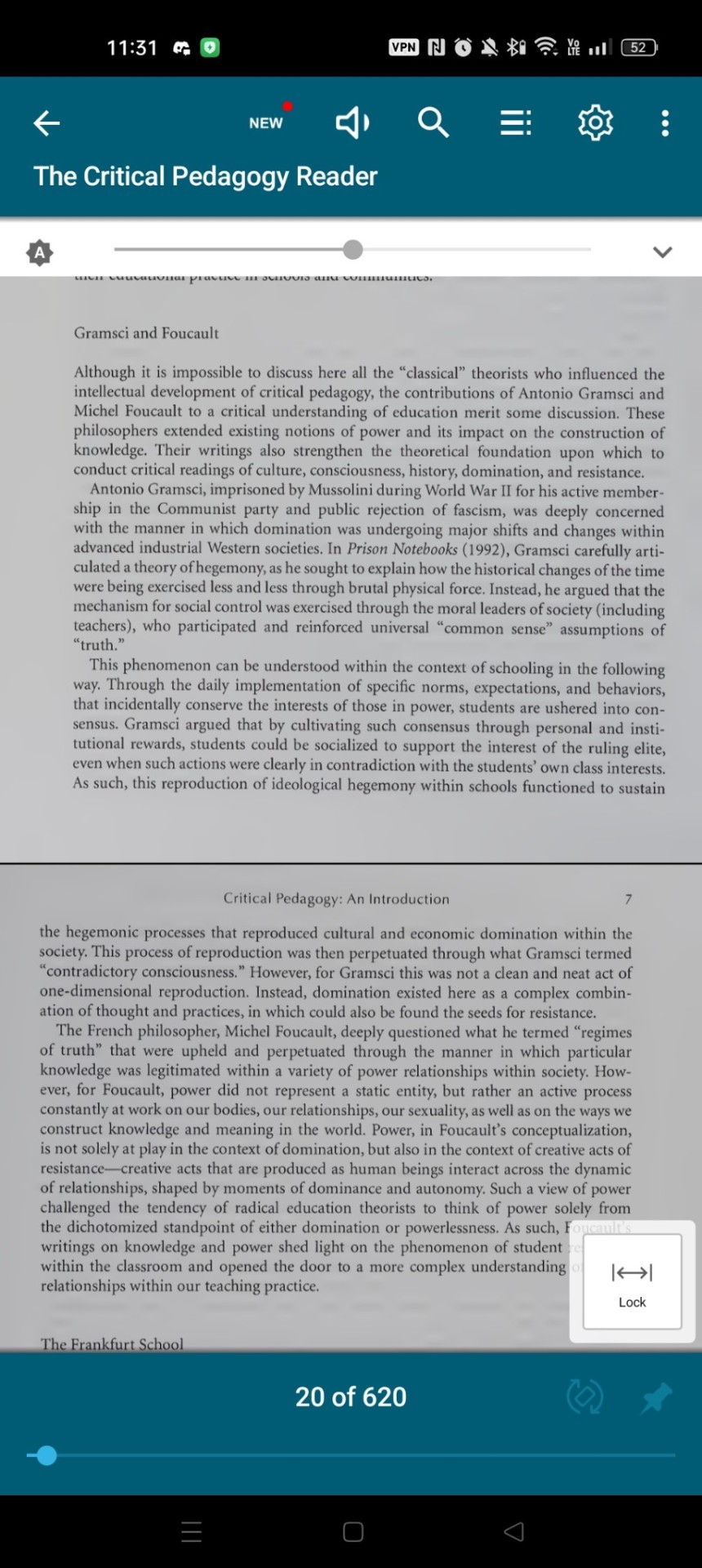
#im also downloading every scotty morrison book there is. i already own a physical copy of his first book on te reo#I anticipate the workbooks coming in VERY handy#and im also glad i was able to find a bunch of texts on new zealand and pacific ece#this text is introductory to critical pedagogy in general and is both VERY interesting and very helpful
5 notes
·
View notes
Text
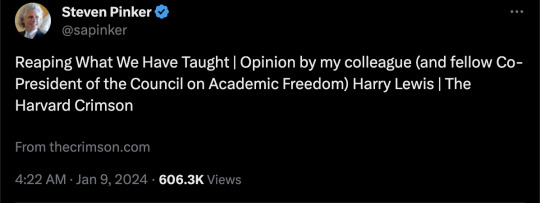
By: Harry R. Lewis
Published: Jan 8, 2024
Let’s go back to how Harvard’s current crisis began: charges of antisemitism.
Why antisemitism seems to be a problem at Harvard and other universities is one of the still-unanswered questions that precipitated the University’s downward spiral.
But, it surely is not Claudine Gay’s fault. It is not because Harvard admits antisemitic students or hires antisemitic faculty. No one is suggesting there are comparable antisemitism problems in other kinds of institutions — such as hospitals or libraries — so there must be something that uniquely happens in universities.
That something must be the source of our woes.
* * *
Unapologetic antisemitism — whether the incidents are few or numerous — is a college phenomenon because of what we teach, and how our teachings are exploited by malign actors.
The Harvard online course catalog has a search box. Type in “decolonize.” That word — though surely not the only lens through which to view the current relationship between Europe and the rest of the world — is in the titles of seven courses and the descriptions of 18 more.
Try “oppression” and “liberation.” Each is in the descriptions of more than 80 courses. “Social justice” is in over 100. “White supremacy” and “Enlightenment” are neck and neck, both ahead of “scientific revolution” but behind “intersectionality.”
Though word frequency is an imperfect measure and the precise counts are muddied by duplicate numberings and courses at MIT, this experiment supports the suspicion that the Harvard curriculum has become heavily slanted toward recent fashions of the progressive left.
For example, “intersectionality” was almost unattested before the year 2000, while published uses of “decolonize” have more than tripled since then.
Merchants of hate are repurposing these intellectual goods that universities are producing.
When complex social and political histories are oversimplified in our teachings as Manichaean struggles — between oppressed people and their oppressors, the powerless and the powerful, the just and the wicked — a veneer of academic respectability is applied to the ugly old stereotype of Jews as evil but deviously successful people.
While Harvard cannot stop the abuse of our teaching, we, the Harvard faculty, can recognize and work to mitigate these impacts.
The political bias in our faculty is now widely accepted. One solution is to use a kind of affirmative action program for conservative thinkers to change the faculty, but that idea is noxious and misses a crucial point.
Professors should not be carrying their ideologies into the classroom. Our job as teachers of “citizens and citizen-leaders” is not to indoctrinate students, but to prepare them to grapple with all of the ideas they will encounter in the societies they will serve.
Instead, individual faculty might diversify what they teach. Committees and departments could enforce a standard that curricula exhibit intellectual diversity and a variety of agreed-upon topics and techniques.
If done correctly, it would not infringe upon individual academic freedom to allow our faculty colleagues to have a stronger role in shaping each others’ syllabi and curricula. Nor would it be improper for the Board of Overseers — with its elaborate Visiting Committee structure — to weigh in on the evident political biases and ideological vectors in our educational program.
As obvious as this all may sound, it would be a big change from the present.
Over the fifty years I have been on the Harvard faculty, the expectation has evolved that individual Harvard professors are free to teach whatever they wish to whomever they wish. It was once the norm for faculty to rotate through courses of unpredictable size and with stable curricula, but now enrollments are predetermined quite rigorously and even introductory courses may change their reading lists and lecture topics drastically when new professors take charge.
Curricular committees theoretically vet these courses, but not annually, and not for the kinds of political biases that have skewed undergraduate education. The result is to favor the hip, current, and “relevant,” over foundational learning — what instructors personally believe to the exclusion of what students should learn to participate knowledgeably in the world outside our gates.
* * *
The leftward shift of Harvard’s faculty deserves scrutiny. Judicious changes to the hiring and promotion process can thwart intellectual inbreeding — just as the current tenure system, now tired and manipulable, was once an innovative revamp of a system that resulted in ethnic and gender homogeneity. Now is the time to change a system that will take decades to alter the composition of the faculty.
But there is no need to wait for that reform.
The goal is not to give students a choice between courses reflecting different ideologies. Harvard should instead expect instructors to leave their politics at the classroom door and touch both sides of controversial questions, leaving students uncertain where their sympathies lie. Professors should have no more right to exclude from their teaching ideas with which they disagree than students should expect to be shielded from ideas they find disagreeable.
All that is required is for faculty to exhibit some humility about the limits of their own wisdom and embrace the formula for educational improvement voiced by Le Baron R. Briggs, a Harvard dean, more than a century ago: “increased stress on offering what should be taught rather than what the teachers wish to teach.”
Harry R. Lewis ’68 is a Gordon McKay Research Professor of Computer Science. He served as Dean of Harvard College from 1995 to 2003.
#Harry R. Lewis#Harvard#Harvard University#orthodoxy#decolonize#decolonization#genocide#ethnic cleansing#antisemitism#academic corruption#academic freedom#higher education#ideological corruption#dogma#viewpoint diversity#religion is a mental illness
10 notes
·
View notes
Note
You’re really cool! /gen
What languages are you learning?
Which ones do you want to become fluent in, in the future?
Where do you learn them?
What’s your favorite language?
Would you advise someone to learn Norwegian?
Do you have a language you’d never want to learn?
What’s the hardest thing for you when learning a new language?
How’s your day going?
ok first thank you for this epic ask. my answer is long so it's under the cut.
I'm currently primarily learning Russian. I am sorta learning Swahili, but I haven't come any far yet.
I'm also continuing to learn french, but I'm already pretty good at french so it's pretty much just reading stuff in french.
I'm sorta learning northern Sami or Sami languages (multiple), but I haven't gotten far.
I'm not sure which languages I want to be fluent in. I guess french, I'm definitely not on a C1 level yet but I know a lot so it's probably the easiest. But I just want to take things as they come a bit. Sami languages (probably northern Sami has most materials) are a candidate, because decolonization and stuff, plus it's a new language family to me which interests me a lot. Though I'll likely try one I know people who speak.
but for learning in general I am considering/currently learning:
- Arabic (maybe Egyptian)
- Swahili
- French
- Russian
- Chinese (probably mandarin)
- Urdu
- Sámi language (unsure which)
- Norwegian sign language
- international sign language
- Usamerican sign language (ASL)
- Thai
And of course I'm probably gonna update this list. (metaphorically speaking, not physically this list in this post)
Where I learn:
So for french I learned primarily in a classroom setting, but honestly that has left me with very weak like audio processing for french.
For Russian I've been using Duolingo which is pretty good, though as people talk about I don't understand the grammar so if I want to use it formally I'm probably gonna diversify. (not sure what I'll do yet)
For Swahili I'm using language transfer. But I struggle to motivate myself to do language transfer lessons. They're primarily audio based and I'm genuinely addicted to music so I'm not always in the mood.
I've also used Polygloss, which is an image description game type thing where you get feedback on your language skills from other users. I would probably recommend this one if it sounds at all interesting to you. This has many languages btw, even toki Pona.
I've used drops but that app fuckings sucks ass. It's difficult to remember stuff in complete isolation. It's like the opposite of reading wikipedia in the target language.
For Thai I've used "Thai drill", which seems pretty good, I haven't gotten far with thai though because I've focused on other languages.
I've used lingodeer the short time I learned japanese, I've heard it's supposed to be really good for that.
I also like using texts, for Russian I've used a lot of wikipedia, trying to just read articles in Russian and see what I understand. For french I've used magazines and lemonde. For Sami I've used just the regular news.
I've tried chatting apps for language learning but I haven't really stuck to them too much so idk if that's for me. I think people like those though.
I've tried YouTube for Norwegian sign language and I find myself less likely to use youtube for language learning, but it definitely helps with getting access to resources when there's little.
Also miscellaneous websites. For Norwegian sign language, Russian and French I've used websites and it's helped at least a bit.
Translation services are essential! Like yeah don't just put everything through translation, but if you need a specific word or want to check your grammar it can be very helpful. I use it a lot in french.
On whether to learn Norwegian that depends what you value.
Some options are: novelty (different language family? unfamiliar writing system?), easiness (similar? are there apps? are there complex conjugations?), practical use (can you watch tv in the language? do you know anyone who speaks it?), different culture (will it give you access to a world radically different to your own?), decolonization (is it a colonized language?)
But personally I'm inclined to say yeah please learn my language. I can recommend resources and help teach you if you chose it, so the easiness is high (plus it's on Duolingo). the practical use, though lowered by the fact that most Norwegians speak english, is decent because it's easy to access free books online in Norwegian, plus news (that may be different like with Palestine - the free national news report does not have to be approved by isnotreal). And in general Norway values freedom of speech. The easiness is raised by you speaking English, and Norwegian also doesn't gender anything depending on subject's gender (unlike french), only grammatical gender, and you can choose between 2 & 3 genders. For novelty it's probably not that interesting though. For decolonization it's a colonizer language, Norway colonized a part of Sápmi and forced them to speak like us, no one colonized Norway. wait actually there might be more than Sápmi? idk I found this about Denmark-Norway, it might be wrong to pin it on just the Danes even though they had the upper hand historically, idk (there was centralized royal rule based in Copenhagen in Denmark). But yeah that last part idk if it really matters, it's not immoral to learn a "evil" language (of any kind), it's more that I consider it extra moral to learn a colonized language. (I wouldn't necessarily consider Norwegian evil but you get what I'm getting at).
For languages I wouldn't learn, honestly there's not many. I'm skeptical towards learning more languages like french because it's hyper gendered & usually non-binary excluding, but I think Spanish for example is one of them and it's so widely spoken it's kinda worth it.
The most difficult thing for me when learning a language, I guess staying consistent. I only have like one perfect month on Duolingo, and for other languages like Norwegian sign language I've not been consistent at all, not even reaching a rate of one lesson a month.
My day is going pretty well, especially after answering this ask :)
#ink.post#asks#anon asks#language asks#language learning#question asks#ink.asks#ink.asks/conversational#ink.asks/questions#ink.asks/compliments
2 notes
·
View notes
Text
Freshwater Pearl Phone Strap & Custom Bracelet Giveaway: Help Families in Gaza!
I am organizing this raffle in order to raise funds for 3 Gaza GoFundMe campaigns. They all have really low funds and donations are coming in slowly for all of them! I have been in frequent contact with all three of them and would be grateful if you can help them out! Due to my geographical restrictions, I can only mail the bracelets to addresses in the UK.
Fill in this form after donating to enter: https://forms.gle/TThCs5fbyn451AAD6

Campaign Details & Donation Links!
Mahmoud Salim's campaign
Donation Link: Support a family lacking healthcare and safety
Mahmoud's Tumblr Account: @mahmoudfamily1
Verification: #117 on this vetted list, also see here
Mahmoud has 17 family members trapped in Nuseirat, including 10 children. Mahmoud almost lost all his family when the house they were sheltering in was bombed with them inside, killing 13 people. Their makeshift tent has been hit by bullets and sharpnel.
Progress: $1,362 CAD raised of $80,000 goal
Mohammed & Ahmed Khalil's campaign
Donation Link: Help Ahmed Khalil's family evacuate to safety
Mohammed's Tumblr Account: @ahmed0khalil
Verification: #77 on this vetted list, also see here
Mohammed is 19 years old and from a family of 8. He has 5 siblings: Fathi (23), Aya (21), Anas (15), Abdullah (11) and Ahmed (6). His father has diabetes, Fathi is blind, and Abdullah is autistic and does not understand what is happening. They are displaced in a classroom in Deir el-Balah.
Progress: €3,687 raised of €50,000 goal
Ahmed Khader's campaign
Donation Link: Help my family to reach save out of Gaza
Ahmed's Tumblr Account: @ahmedpalestine
Verification: see here
Ahmed has 12 family members including 6 children, in Maghazi right now. He has recently lost his cousin, also named Ahmed, who was a father of 3 children, including a 2-month-old baby girl. He was killed by a missile while fetching water for his family.
Progress: €5,465 raised of €55,000 goal



Instructions:
Donate a minimum of €5/$5 to enter the raffle! Each €5/$5 counts as an entry, so if you donate €10, you will be entered twice.
You will get a free extra entry if you donate to all 3 campaigns (e.g. if you donate €5/$5 to all 3 campaigns, you will be entered 4 times instead of 3).
You will also get a free extra entry for every €/$30 you donate!
Additionally, for every €/$100 you donate...
I will make you a bracelet regardless of if you win the raffle, and you can choose the colour and the beads I use!
If you donate to all 3 campaigns you can choose to add a freshwater pearl to your bracelet!
e.g. if you donated to all 3 campaigns and the total is €/$200, I will make you two bracelets, and you can choose to add a pearl to each of the bracelet!
The deadline for entering this raffle is 10 December, 2024.
Thank you for donating and supporting families in Gaza!
Tagging for reach, please message me if you want off the mailing list! We thank you in advance.@dlxxv-vetted-donations@ahaura@ana-bananya@northgazaupdates@c-u-c-koo-4-40k@riding-with-the-wild-hunt@roadimusprime@aces-and-angels@just-browsing1222@neptunerings@mushroomjar@northgazaupdates2@kyra45-helping-others@decolonize-solidarity@heritageposts@commissions4aid-international
@brutaliakhoa @decolonize-the-everything @postanagramgenerator@heydreamchild
@bixels @aria-ashryver@schoolhater@pcktknife@transmutationisms@sawasawako@feluka@magnus-rhymes-with-swagness@werewolf-transgenderism
@watermotif @stuckinapril @chanafehs@malcriada @appsa @serialunaliver @buttercuparry
@gothhabiba @punkitt-is-here@stil-lindigo@prisonhannibal@genderdog
@ankle-beez @lonniemachin @dykesbat @charlott2n @watermotif
@mavigator @lacecap @yugiohz @vakarians-babe @socalgal
@chilewithcarnage @ghelgheli @sivavakkiyar @anneemay @plomegranate @fluoresensitive @determinate-negation @girlinafairytale@cigaretteaunt @murderbot @heydreamchild
515 notes
·
View notes
Text
Yesterday I went to a workshop/optional lesson on decolonizing pedagogy. It definitely helped solidify my understanding of what decolonization is (which is what the first part was mainly for).
At one point there was a small group discussion about how a student needed extra time in a quiet area for accomodations, and in the hypothetical scenario the other students saw that as cheating.
I have never been through this, but I guess it's something that can happen.
The answers from professors were incredibly useful because stuff like "keep the student from sharing around others" and "see if that anger is coming from need" is not something I would've considered as the person only seeing ableism.
At the end, I sat there and said (mic in hand btw) "As someone who has received such accommodation, it's literally harder to cheat with those accommodations than in your classroom! They make you leave your backpack at the door and only allow you to take a pencil in! I had to wait 10 minutes once for them to call and verify with my professor that it was open note! You can't cheat, it's basically impossible!" To which made a good amount of the room laugh.
"Well, that's another possible response to the students"
2 notes
·
View notes
Text
Iconic lives.
Tributes continue to pour in for the writer that was Ngugi wa Thiong'o who passed away on May 29 aged 87. Mr Thiong'o is best remembered as an indefatigable scribe, a tireless political activist, a decolonizer of the African mind, a teacher, as well as a friend to many including writer and academic Azfar Hussain.

With Ngũgĩ wa Thiong'o at Washington State University in 2005.

Devastated —that’s the word, and yet it feels profoundly insufficient. Ngũgĩ wa Thiong’o dies at 87.
Today we've lost Ngũgĩ: my favorite fiction writer and playwright, a theorist of language and liberation, an unflinching activist, and a comrade with whom I shared not only ideas but also moments of warmth and revolutionary laughter.
Although I intend to write more fully about Ngũgĩ later, let this brief note bear witness now.
Ngũgĩ's novelistic aesthetic was never innocent —his prose bore the beautiful burden of politics, the dirt and dignity of struggle, the fire of collective emancipation.
He knew how to "rub his conceptual blocks together in such a way that they could catch fire," to use Marx's words from another context. I once shared with him the poetry of Kazi Nazrul Islam —the fiercest revolutionary voice in Bangla literature. Ngũgĩ listened intently, eyes alight, then registered his unwavering solidarity thus: “Nazrul is our poet. Nazrul is a Kenyan poet.” That moment lives on in me, as does his insistence that the African story is indissociable from the global cry for justice.
I was honored to present at Washington State University a critical overview of his body of work —in his presence— back in 2005 (you’ll find a link at the end of this note, one that shows Ngũgĩ and me together). And how could I forget: the second photo below captures his handwriting, carefully writing out 'Salma,' the name chosen for my daughter before she was born on July 22, 2005. The first photo was taken at Washington State University in 2005 —a moment suspended in memory.
Ngũgĩ may have laid down his body, but he has not departed. He lives on in my stories, in my classrooms, in my memories, and, above all, in his own words and work, which will long outlive all empires.
Let the empire tremble. Ngũgĩ walks among us still.
https://www.facebook.com/27212882/posts/10108710373164423/
0 notes
Text
Episode 212 - Language & Linguistics
It’s episode 212 and time for us to talk about excellently complicate the non-fiction genre of Linguistics & Language! We discuss 🤔, our academic backgrounds, the power of words, accents, and more!
You can download the podcast directly, find it on Libsyn, or get it through Apple Podcasts or your favourite podcast delivery system.
In this episode
Anna Ferri | Meghan Whyte | Matthew Murray 🦇 | Jam Edwards
Things We Read (or tried to…)
Because Internet: Understanding the New Rules of Language by Gretchen McCulloch
Fifty Sounds by Polly Barton
In Other Words by Jhumpa Lahiri, translated by Ann Goldstein
I is an Other: The Secret Life of Metaphor and How it Shapes the Way We See the World by James Geary
Babel: Around the World in Twenty Languages by Gaston Dorren
Other Media We Mentioned
19 Ways of Looking at Wang Wei: With More Ways by Eliot Weinberger
Through the Language Glass: Why the World Looks Different in Other Languages by Guy Deutscher
Otherwords - Inside the Fiercest Debate in Linguistics
Your Computer Is on Fire edited by Thomas S. Mullaney, Benjamin Peters, Marie Hicks, and Kavita Philip
What the Font?! - A Manga Guide to Western Typeface by Kuniichi Ashiya
Giga Town: A Guide to Manga Iconography by Fumiyo Kouno, translated by Ko Ransom
The Life-Changing Magic of Tidying by Marie Kondō, translated by Cathy Hirano
Occasional reminder that whenever you say "sparks joy" you are not quoting Marie Kondo. You are quoting her translator, Cathy Hirano. She invented "sparks joy" out of whole cloth. What Marie Kondo says is "This makes my heart go pitter pat.” -Zack Davisson
Eine wie Alaska [Looking for Alaska] by John Green, translated by Sophie Zeitz
“I would read it in German, for a few reasons” - John Green
Die kleine Fledermaus Wegda by Nanna Nesshöver and Wiebke Rauers
Lingo: A Language Spotter's Guide to Europe by Gaston Dorren, translated by Alison Edwards
Links, Articles, and Things
Great Vowel Shift (Wikipedia)
Lolcat (Wikipedia)
Kinokuniya
There are four Kinokuniya shops in Texas. Four! Put one in Denver!
Abugida (Wikipedia)
Episode 209 - Design
15 Language & Linguistics Books by BIPOC Authors:
Every month Book Club for Masochists: A Readers’ Advisory Podcast chooses a genre at random and we read and discuss books from that genre. We also put together book lists for each episode/genre that feature works by BIPOC (Black, Indigenous, & People of Colour) authors. All of the lists can be found here.
Otter's Journey Through Indigenous Language and Law by Lindsay Keegitah Borrows
The Skin That We Speak: Thoughts on Language and Culture in the Classroom edited by Joanne Kilgour Dowdy and Lisa Delpit
Tongues: On Longing and Belonging Through Language edited by Eufemia Fantetti, Leonarda Carranza, and Ayelet Tsabari
Living Language Rights: Constitutional Pathways to Indigenous Language Education by Lorena Sekwan Fontaine
Grammar Matters: The Social Significance of How We Use Language by Jila Ghomeshi
A Tale of Monstrous Extravagance: Imagining Multilingualism by Tomson Highway
My Broken Language: A Memoir by Quiara Alegría Hudes
Et Cetera: An Illustrated Guide to Latin Phrases by Maia Lee-Chin with illustrations by Marta Bertello
Translating Myself and Others by Jhumpa Lahiri
Nine Nasty Words: English in the Gutter – Then, Now, and Forever by John McWhorter
The Ecology of Language Evolution by Salikoko S. Mufwene
Mâci-Nêhiyawêwin / Beginning Cree by Solomon Ratt with illustrations by Holly Martin
Living Pidgin: Contemplations on Pidgin Culture by Lee A. Tonouchi
Kingdom of Characters: The Language Revolution That Made China Modern by Jing Tsu
Decolonizing Language and Other Revolutionary Ideas by Ngũgĩ wa Thiong'o
Give us feedback!
Fill out the form to ask for a recommendation or suggest a genre or title for us to read!
Check out our Tumblr, join our Discord Server, or send us an email!
Join us again on Tuesday, June 3rd when we’ll be discussing “Found Books,” that is books that we’ve found in public little free libraries, book exchanges, and book swaps.
Then on July 1st we’ll be talking about Non-Traditional Storytelling (e.g. fiction that’s not prose)!
0 notes
Text
Class Norms and Decolonizing Education
The class norms that were developed in conversation with professor-students conversation was evidentiary of decolonizing education. This practice challenges traditional classroom dynamics and fosters a more inclusive, relational, and transformative learning environment (Poitras Pratt & Bodnaresko, 2023). Here are the list of class norms developed:
Value Process Over Perfection
This norm shifts the focus from rigid, product-oriented standards to valuing growth, reflection, and intentionality. In a Eurocentric classroom, success is often measured by final outcomes and standardised assessments. By emphasising process, our class recognised learning as a journey, where mistakes and self-reflection are integral. This approach aligns with decolonial pedagogy, which honours diverse ways of knowing and being, and resists the pressure to conform to academic benchmarks (Donald, 2009).
Connect Learning to the Real World
Decolonizing education means rooting learning in lived experience, land, and community. Our norm to connect learning to the real world disrupts the traditional separation between academic knowledge and everyday life. We are often told that our experiences are the exception, not the rule; that the truth is held is statistics and research. But discussing real-world experiences, encourages us to see knowledge as dynamic and interconnected, not confined to research papers or institutions. This approach also supports place-based and experiential learning, which are central to Indigenous pedagogies and help restore cultural knowledge and community connections (Poitras Pratt & Bodnaresko, 2023). My experience was not a minority in the classroom.
Manage Intent & Impact, with a Focus on Impact
Traditional classrooms often prioritise intent, excusing harm if it was unintentional. Our norm, however, centres the impact of our words and actions, especially regarding experiences of marginalisation. This shift calls for relational accountability and ongoing self-examination, which are essential in decolonial spaces (Donald, 2009). It also creates a safer environment for all students by acknowledging harm and working towards repair, rather than dismissing it.

Contribute to Cultivating an "Ethical Space"
Ethical space, as described by Indigenous scholars like Ermine, is where multiple worldviews can coexist respectfully. Our class norm to co-create ethical space moves beyond token inclusion of Indigenous perspectives. It requires ongoing dialogue, truth-telling, and critical thinking, allowing Indigenous and non-Indigenous knowledges to be honored on their own terms (Poitras Pratt & Bodnaresko, 2023). This practice is foundational for reconciliatory education and supports the transformative potential of relational teaching and learning (Donald, 2009).
Share the Air: Take Space, Make Space
Dominant voices have historically silenced the voice of minority. Often, participation is often dominated by a few, reinforcing existing power structures. By encouraging everyone to self-reflect on their presence and participation, we foster equity and collective responsibility.
Speak from the "I" Perspective
Speaking from personal experience resists universalising narratives and honours subjective truth. In decolonial work, this practice helps us stay grounded in our own standpoint while respecting others'. It also prevents the erasure of individual experiences and supports deeper listening and understanding within the group (Donald, 2009).
Stories Stay, Lessons Leave
Stories are sacred in indigenous practice, this norm recognises it. By affirming that personal sharing is a gift, not content to be extracted, we are reminded to carry forward the teachings with care, not the storyteller’s identity or trauma. This approach resists the colonial tendency to commodify knowledge and instead fosters ethical relationality and respect for community protocols (Poitras Pratt & Bodnaresko, 2023).
Participating in a classroom guided by these norms has been transformative. I noticed how shifting from product to process allowed me to take risks and reflect more deeply on my learning. Connecting our studies to real-world issues made the material more relevant and meaningful. The emphasis on impact over intent challenged me to be more mindful and accountable in my interactions.
Creating ethical space was not always easy, but it encouraged honest conversations and mutual respect. Sharing the air helped me become more aware of my own participation and made space for quieter voices. Speaking from the "I" perspective deepened my empathy and understanding of others’ experiences. Finally, the norm around stories reminded me to treat classmates’ disclosures with care and responsibility.
Overall, these norms not only disrupted traditional power dynamics but also invited both students and professors to unlearn colonial habits and assumptions. They encouraged us to build a classroom community rooted in respect, accountability, and relational learning—key elements for decolonizing education and moving toward reconciliation (Poitras Pratt & Bodnaresko, 2023; Donald, 2009).
0 notes
Text
Reading Journal #10
In the class we had on the Thursday before we went on spring break, I remember picking out different pedagogies that had stuck out to us and ones we would want to use in our future classrooms. Of the three I chose, the top one for me was community-based pedagogies. As I reflected on the readings for this week, specifically the powerful narratives from Aydé Enríquez-Loya and Kendall Leon’s "Chicanx/Latinx Rhetorics as Methodology for Writing Program Design at HSIs" and Isabel Baca's poignant testimony "Hispanic-Serving or Not: La Lucha Sigue in Academia," I could feel how important community was in each of these articles not only in educational advancement but also in the personal and collective empowerment seen throughout. So, if you couldn't tell already, I will dive into the community and its power within us.
Enríquez-Loya and Leon place a great deal of emphasis on how crucial the role of Chicanx/Latinx rhetoric is in being a transformative methodology as it “centralize[s] Chicanx rhetoric in the design of writing programs,” as it creates inclusive and supportive environments that work to disrupt the traditional educational binaries and borders we are so used to seeing in everyday education (213). I liked their assertion because I learned the necessity for this program and curriculum as they truly reflect the cultural realities relating to their student bodies, and they are not some token gestures that seem authentic but are just at the end of the genuine in themselves. This method is based on community elegance because of the acknowledgment of the students and their lived experiences and the use of those experiences to strengthen the pedagogical approaches. They articulate it even more beautifully through Anzaldúa’s concept of Conocimiento, a pedagogical shift in which there is a “developing a critical and decolonized consciousness that moves from rupturing to fragmentation to connecting, assembling and rebuilding” (213).
While reading Baca’s testimony, I was given a painful window to look through into the lived reality of navigating academia as a Latina scholar at an HSI. I was born with a large amount of privilege, being born a white woman into a middle-class family, so I don’t know what it is like, nor will I ever know what it is like to experience what Baca has gone through. However, through her experience, she highlights a supportive community's important role in helping to challenge and dismantle institutional racism. This supportive community would consist of BIPOC allies and white accomplices like myself. For me, I have never understood why just based on someone’s skin tone, culture, or heritage makes them less than another, so I will always fight for everyone to be placed on an equal playing field and be given the equity they deserve. Through Baca’s lens, she places community-based pedagogies as not just an educational choice but as one of the essential acts of resistance and survival with academia that resonated with me. We must build communities where BIPOC scholars can share stories of "healing, triumph, recovery, resiliency, and strength" (Baca 74). While these spaces may not have a place for me in them, that does not matter because, at the end of the day, I would not understand. These two works offered me new insights into how there are needs for communities that don't include me, but I can still offer a hand in helping to offer them support.
0 notes